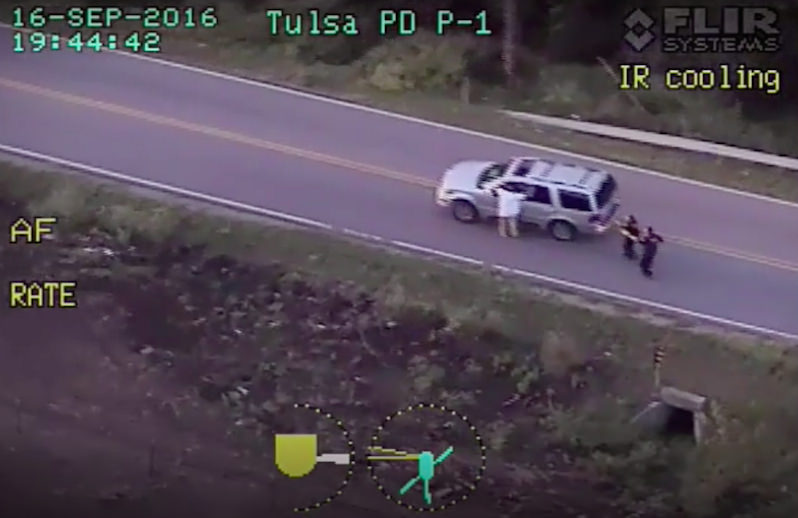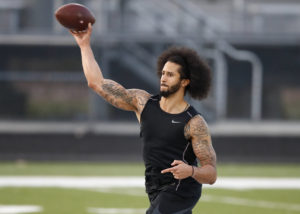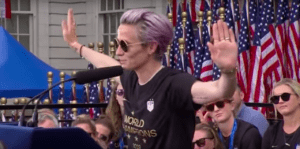Footage in Oklahoma Police Shooting Prompts Nationwide Outrage
Terence Crutcher, an African-American man, was killed by a white police officer in Tulsa on Friday. A video of the incident has caused many to argue that he was killed “in cold blood.”
Helicopter footage shows police officers confronting Terence Crutcher moments before he is shot. (Screen shot via The New York Times)
Police in Tulsa, Okla., on Friday responded to a 911 call regarding a broken-down vehicle blocking a road. The vehicle belonged to Terence Crutcher, an African-American man. Minutes after police arrived on the scene, Crutcher was fatally shot by Officer Betty Shelby, who is white.
“This epitomizes the black experience in America,” author and activist Shaun King says of the incident. “Something that should have been routine and safe turned out to be fatal.”
The Tulsa Police Department released video footage from a police helicopter and a police car dashcam three days after Crutcher’s death (warning: the footage is graphic). The video, which shows Crutcher walking calmly to his vehicle with his hands raised before being shot by Shelby, has prompted nationwide outrage.
Shelby, who has been placed on paid administrative leave, has been the subject of two complaints of excessive force while on the Tulsa police force. According to ABC News, “[d]ozens of protesters have called for Shelby’s immediate arrest,” and protests continue in Tulsa.
In a news conference Monday, Tulsa Police Chief Chuck Jordan revealed that Crutcher was unarmed. “I’m going to tell you right here now: There was no gun on the suspect or in the suspect’s vehicle,” he said. He also stated that “protests were not a problem” and that they are “a very valid way for people to air their grievances.”
“Tulsa Police Officer Betty Shelby should be arrested today for killing Terence Crutcher,” King argues in his piece. The American Civil Liberties Union of Oklahoma also condemned the shooting. Ryan Kiesel, executive director of the Oklahoma ACLU, said in a statement:
A Tulsa Police officer murdered Terence Crutcher in cold blood. Each of the officers present were complicit in the unconscionable, reprehensible, and disgusting killing of this unarmed, defenseless man, by allowing him to bleed to death on the street rather than attempting any immediate medical aid or attention. These Tulsa Police Department officers have made it abundantly clear how little regard they have for Tulsa’s communities of color. By shooting a defenseless black man and then shirking their legal and moral obligation to render aid as he lay dying in the street, these TPD officers clearly could not care less about whether the black citizens they are sworn to protect live or die. …
These videos prove that the Tulsa Police Department’s initial claim that Terence Crutcher was refusing to put his hands in the air was a boldfaced lie, as were TPD’s statements about his transport and death at a local hospital. The videos are clear—Terence had his hands in the air, and posed no threat to those present—right up until one of the officers gunned him down, and then her four companions watched him bleed to death in the street, making no attempt to render aid.
As Kiesel notes, Crutcher’s race is an important aspect of the case. In the days since the footage was released, the Department of Justice has launched an investigation into Crutcher’s death. “Danny C. Williams, US Attorney of the Northern District of Oklahoma, said prosecutors will attempt to determine whether a federal civil rights violation had occurred,” reports CNN.
King presents evidence suggesting that Crutcher’s race was a factor in his murder. “One audio dispatch from police … is particularly telling, with an officer overheard saying Crutcher looked like ‘one bad dude,’ ” King writes. He continues:
What does that even mean? What made him look like one bad dude? His blackness?
This man was a beloved father and son and was well known in his community. He wasn’t even wanted for a crime, but was there because his car [had] broken down on the way from school. One bad dude?
In Oklahoma, a black person is four times more likely to be killed by police than a white person, according to the organization Mapping Police Violence. Police have killed 212 black people nationwide so far this year.
After the police footage in Crutcher’s case was released, King took to Twitter to share 25 ways to reduce police violence, including drug testing among police officers, the elimination of quota systems, testing officers for racial bias and mandatory body cameras for every police officer.
Other activists have referred to the recent national anthem protests, initiated by football player Colin Kaepernick, in the wake of Crutcher’s death.
I hope I see the same amount of outrage on here for this killing of an unarmed American citizen as I do for someone kneeling
— Duane Brown (@DuaneBrown76) September 20, 2016
You ask us why we protest.
You ask us why we kneel.
You ask us why we cry.Click the #TerenceCrutcher hashtag and find out
— Max Keeble (@_CasanovaJr) September 20, 2016
“This country should be embracing those peaceful athletes and hope that they are the model for what’s to come,” King says in another piece published Tuesday.
Although still under investigation, Crutcher’s death adds to the growing list of African-Americans killed at the hands of U.S. police officers. Race relations and police brutality continue to be at the forefront of the political conversation, and some of the current presidential nominees have addressed Crutcher’s death on social media:
Another unarmed Black man was shot in a police incident. This should be intolerable. We have so much work to do. #TerenceCrutcher -H
— Hillary Clinton (@HillaryClinton) September 20, 2016
The baseless assumptions and callousness towards #TerenceCrutcher before he was shot dead are indicative of systematic bias that has to end.
— Dr. Jill Stein (@DrJillStein) September 20, 2016
Meanwhile, Crutcher’s family awaits the results of federal and state investigations. Tiffany Crutcher, Terence’s twin sister, believes charges should be pressed against the officers involved in her brother’s death.
“Terence Crutcher should be alive right now,” King says. “His gruesome death and the abandonment of him by police as he fought for his final breaths has gripped our nation because everything about it was so damn inhumane and excessive. What this case isn’t, though, is rare.”
Independent journalism is under threat and overshadowed by heavily funded mainstream media.
You can help level the playing field. Become a member.
Your tax-deductible contribution keeps us digging beneath the headlines to give you thought-provoking, investigative reporting and analysis that unearths what's really happening- without compromise.
Give today to support our courageous, independent journalists.






You need to be a supporter to comment.
There are currently no responses to this article.
Be the first to respond.